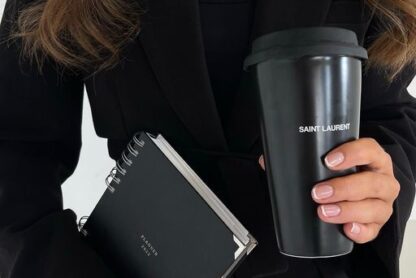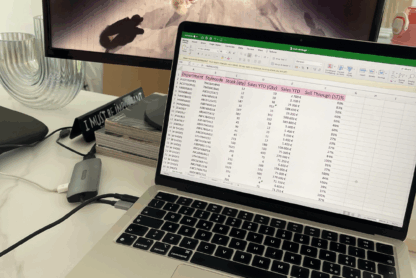Do you dream of working in fashion but you don’t see yourself as a designer or stylist, but rather managing the business aspects of a fashion brand or even running your own fashion company one day?
Fashion Brand Management is a less-known but exciting career that perhaps you didn’t consider.
I graduated with a master’s in luxury fashion management because I always saw myself on the business side of the industry rather than in a creative department. I landed jobs in e-commerce at YOOX-Net-a-Porter, and Alexander McQueen, and today I dedicate myself full-time to running my own company Glam Observer to help you get a job in fashion.
So as a specialist in fashion management, I wanted to help you navigate this career. I will explain the concept of fashion branding first so you can better understand what a brand manager does, and then share tips on how to become a fashion brand manager.
What is Fashion Branding And How To Become A Brand Manager
What Is Fashion Branding?
What’s the first brand that comes to your mind? Have you ever asked yourself what makes you want to buy a product of one brand over another?
Is it because you saw a beautiful ad campaign? Is it the way the fashion piece makes you feel, how you imagine wearing or carrying it? Or do you appeal to the brand’s value of sustainability?
How you perceive the brand and its products is the result of fashion branding. Probably everyone has heard of Gucci, Burberry, or Louis Vuitton – even if they are not fashion savvies or have never bought from their stores – simply because these companies have a strong brand.
If we look at the product, fashion branding is about adding context to a product with the ultimate goal of making it appealing to customers. This context is given through different tools: marketing campaigns, communication, storytelling, retail design, packaging, the logo…all with the goal to make the product more desirable so more people can buy it.
However, fashion branding is not only about the product and the visuals. A brand identity is constructed on the entire experience of the brand. Its mission, values, and customer service, among other elements, are equally important. Every brand is different and has its own identity, so it’s important to show it by creating powerful branding.
The dream that brands try to convey and sell is the driver of their business. If you think about it, it’s not necessarily the clothes and shoes themselves that we are driven towards, but the feeling they provide us – comfort, status, power, elegance…
Ralph Lauren said: ‘I don’t design clothes, I design dreams”.
Therefore, companies work on fashion branding to convey a message and generate certain emotions in their customers, so that they go to the brand looking for a product that will give them that emotion and satisfaction. That’s why some brands are associated with luxury, prestige, timelessness, freedom, extravagance, and other notions.
In addition, fashion branding is done with the purpose of differentiating the brand and its products from the competitors. There are a million dresses and shirts and bags on the market, so in order to stand out, companies have to present the fashion piece with a unique identity that will make customers lean towards Chanel instead of Versace, or a Dior bag instead of a Prada bag, just to give you an example.
As you understand, taking care of fashion branding is the responsibility of a brand manager, so let’s dive into this role.
Who Is The Fashion Brand Manager And What Are Their Responsibilities?
The fashion brand manager works on the business side of the brand, taking care of shaping its identity, preserving its image, and constructing the entire experience around the brand. Sounds fascinating, right? Being in charge of developing and growing the brand.
The main responsibilities of the fashion brand manager include:
- Fully understand the DNA of the brand in terms of its history, mission, values, personality, and target audience
- Manage consistency between style, positioning, sales conditions, and range highlights for all markets in all distribution networks.
- Establish the product strategy based on corporate strategies (product, assortment, pricing)
- Conducting analysis of the market, trends, customers, competitors, production
- Develop the annual marketing plan ensuring brand objectives, strategic lines, activities, and key facts including quarterly plans by Region
- Managing all the financial aspects of the company, and allocating the right resources and investments to the various activities to achieve the objectives
- Building relationships with the company’s stakeholders
Due to the nature of their tasks, fashion brand managers have to work closely with other departments – especially with buying, merchandising, and marketing/PR teams. Therefore, they have to keep all internal and external departments aligned and informed of all the activities going on.
What skills does a fashion brand manager need?
Project Management Skills
It may sound obvious yet important to highlight: a fashion brand manager needs some serious management skills to manage every aspect of the brand, the different projects, and people – those who are under their direct supervision, but also cross-functional teams working in different departments of the brand. With great leadership, the brand manager needs to ensure everyone is on board and heading in the same desired direction and bringing positive results for the brand.
Business Mindset
Brand managers look beyond fashion as a sole form of art and pay attention to its business aspects. Making a profit is the top goal, of course, so knowledge of budgeting and financial analysis is crucial. Preserving the image and reputation of a brand is also a business. A strong business acumen will help you make strategic decisions that align with the brand’s goals and objectives.
Creativity
Creativity in fashion is not only about designing clothes, styling looks, and dressing shop windows. Fashion brand management also requires creativity when it comes to proposing new and unique strategies, building eye-catching campaigns, and so on. The creative component must remain present across the whole business strategy because without it, the brand won’t simply stand out, and won’t be perceived as original and innovative.
Marketing and PR skills
Even though brand managers work together with the Marketing and PR teams, it’s still useful to have knowledge in these fields because they are essential in brand management: consumer behavior, brand positioning, etc. In addition, in some companies this role can overlap with the one of a Marketing or PR manager because of the similar nature of their tasks, so it’s another reason to see yourself not only as a brand manager but also as a Marketing/PR professional.
Communication skills
Effective communication is crucial in many roles in the industry and fashion brand management is no exception. You will be working with a diverse team of professionals, including designers, buyers, merchandisers, marketing, and PR managers, not to mention external stakeholders as well. Therefore, strong communication skills will make your job easier and the collaboration more successful.
Fashion and luxury industry knowledge
Being responsible for overseeing the business part of a fashion company requires an understanding of how the fashion industry works. You also have to be committed to continuous learning in the fast-evolving fashion landscape. This includes staying up to date with the latest trends and practices by reading reports, magazines, and digital papers (Vogue, Vogue Business, the Business of Fashion, WWD…) attending fashion shows, and participating in conferences.
Flexibility
The fashion industry is known for its rapid pace and continuous industry developments. As a fashion brand manager, you need to be prepared to notice these changes and meet them with flexibility and adaptability, staying open to new ideas and adopting new strategies to stay ahead in the competitive fashion landscape.
What to study to become a fashion brand manager?
Just because brand managers work at a fashion company doesn’t mean you have to attend a fashion school. I always say you can break into the fashion industry with no fashion degree. And yes, while it can be useful for creative careers (though not essential) working on the business side of a fashion company as a brand manager requires no fashion studies. So this is good news for you in case you haven’t considered this.
Let’s look at your options.
A degree in business, marketing, management, economics, or finance can give you a solid foundation to pursue a career in brand management.
You can later take online fashion courses to learn about fashion and demonstrate your passion and commitment to the industry and continuous learning outside of your formal education.
As you can see, there are so many different options for what to study to become a fashion brand manager. While a degree – no matter which one you choose – is required by fashion companies, you should know it’s a simple formality. Indeed, recruiters don’t pay as much attention to what you studied and where as they did in the past. Though education is important and you need to gain the necessary knowledge and skills, nowadays, almost everyone has access to a university, so a degree is no longer something that makes you stand out and make your CV shine.
If you are a beginner, looking to break into the fashion industry as a brand manager, you need to gain practice in the real world and start with fashion internships, specifically a brand management internship.
How To Become A Fashion Brand Manager?
A brand manager is a senior role, so you won’t begin your career in this field as a brand manager but rather as an intern to the brand manager.
What does a fashion brand management intern do?
As a brand management intern at a fashion or luxury brand, you may be required to assist the brand manager with the following tasks:
- Conducting market research, trends, and competitor analysis
- Creating marketing campaigns
- Accompany the brand manager to meetings and appointments
- Drafting reports and taking care of the presentations
You won’t likely be asked to build business plans and strategies because it’s a big responsibility and requires experience. However, if you have any ideas, they will be welcome and appreciated. My advice is to be proactive and try doing a bit more than is required and expected from you so that your boss and the team can notice your potential and value to the company. It’s a proactive attitude that can help you turn an internship into a promotion.
Since a brand manager’s tasks often overlap with the activities of marketing, communication, and PR, as an intern, you are likely to assist the brand manager with those. You may also work with the marketing, digital, PR, or communication teams and not directly with the brand manager.
This also means that if you want to become a brand manager in the future, you can also start with internships at luxury and fashion brands in related departments, for example:
- Marketing Internship
- Project Management internship
- Business Development Assistant/Intern
- Marketing Project Manager Intern/Assistant
- E-commerce Intern
- E-merchandiser Intern
How to find brand management internships
The first thing you need to do is visit the official pages of brands and luxury groups (LVMH, Kering…) to see if they have any open vacancies.
I noticed it’s more common to find brand management internships online using keywords like “PR, Marketing, Digital/Social Media intern”, than “brand management intern”. So don’t be afraid if you don’t find any internship offers with that mention, and rest assured there are opportunities in this field, just under different titles. As I said, the tasks can overlap with those of a brand manager, but even if they are different, interning in a PR or Marketing department will open doors for you for a future role in Brand Management.
If you don’t find any job postings you like or there are not enough, you should try an unconventional strategy: emailing the companies directly. You can find the brand managers working at your favorite brands on LinkedIn, and send them a cold email introducing yourself and asking for an internship opportunity.
Attach to your email your resume, a customized cover letter, and a portfolio (yes you can and should send one to multiply your chances of getting noticed among recruiters and landing the job/internship) Companies love this strategy; they appreciate people who think outside of the box.
I hope you have a clearer idea now of how to become a fashion brand manager. If you want to go further, enroll in my free webinar where I teach more about emailing companies directly, how to build a portfolio with zero experience, and other tricks and unconventional strategies to break into the fashion industry.







